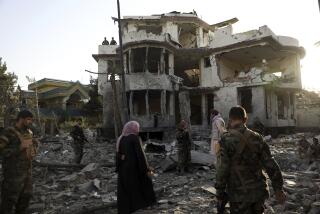U.N. Envoy Urges Delaying Afghan Vote
- Share via
KABUL, Afghanistan — Afghanistan should delay national parliamentary elections slated for June because of security problems, the outgoing United Nations envoy said.
U.N. special representative Lakhdar Brahimi also said foreign countries should consider Afghanistan’s needs when making decisions that affect its political future.
“A parliamentary election is not feasible -- the voter registration will not be there because of security,” he said. “I don’t think there is a pressure from the Afghans to have the elections. There is not pressure from the Afghans or the United Nations. I think foreigners have got to realize there is a lot of work to be done in terms of security.”
In a wide-ranging interview with The Times, Brahimi emphasized that Afghans must play a bigger role in reconstruction if they expect the international community to provide more money and other aid.
Brahimi’s term as special representative ends after the conclusion of the loya jirga, or grand assembly, which is debating a new constitution. The former Algerian foreign minister was given an Afghan passport and citizenship last week as a token of appreciation for overseeing the U.N.’s civilian aid and political and human rights programs since the fall of the Taliban regime. His successor has not been named.
A growing number of Kabul residents are calling for a delay of the voting for the legislature’s two lower houses, scheduled for June. The date was decided in the Bonn agreement, the country’s postwar blueprint.
Among the critics is the Afghanistan Research and Evaluation Unit, a Kabul think tank that has said an ill-timed election could push the country back into civil war.
The southern and eastern regions -- home to the country’s largest ethnic group, the Pushtuns -- are off-limits to U.N. election observers. If the Pushtuns are not properly represented, the election could be declared illegitimate.
“I think there is very likely to be a presidential election because the entire country is one constituency,” Brahimi said. “If you cannot vote in your district for the president, then people can go outside and vote anywhere. But in parliamentary elections, the people of Zabol [province] have got to vote in Zabol and elect someone to represent them there.”
Brahimi also was critical of the international community, which has been slow to volunteer troops to secure portions of the country increasingly targeted by Taliban insurgents.
Western countries “adopt a resolution that says, ‘You civilians, you go there but it is too dangerous for us,’ ” Brahimi said.
“We civilians who are not trained to protect ourselves, who are not equipped to protect ourselves -- they find it normal and acceptable for us to be in a place that is too dangerous for soldiers. This doesn’t make any sense to me. I grew up with the notion that soldiers were more courageous than that.”
But Brahimi also said Afghans need to take more responsibility for the reconstruction effort. Potential donor countries will be reluctant to give money if they believe Afghans are not doing enough to help their own economy.
“I hope [aid money] is proportionate to how well the Afghans do. The international community will not support Afghanistan forever.
“Afghans can have productive agriculture, they have a great tradition as traders.... I’m sure they can organize exports of a lot of things. Carpets, for example, and other handicrafts.”
Brahimi’s concerns about security were echoed by two tribal elders from the troubled southern province of Zabol who traveled to the capital last week to ask the government for help because their villages had fallen under Taliban control.
Mohammed Zarif, district commissioner of Nawbahar, said his was among five areas that have been ruled by the Taliban since the summer.
“The central government has no control here,” Zarif said. “The Taliban are moving around my village on motorbikes. In the mosques they are passing messages that no one has the right to participate in the elections or the loya jirga. There is no need to spread night letters -- they are walking freely on the streets.”
Zarif said the Taliban had implemented strict Sharia, or Islamic law.
“Women have to be kept at home. In my remote village, some small girls were going to school last summer, but when the Taliban took over the schools were shut down.”
Taimur Shah, a tribal elder from the Shamalzai district near the Pakistani border, blames the governor of Zabol and the local administration for not doing enough to assert their authority.
“If the world community comes to us, we are ready to cooperate,” he said. “The people want to help the government get rid of the Taliban. They are back in Afghanistan and no one wants to do anything about it.”
More to Read
Sign up for Essential California
The most important California stories and recommendations in your inbox every morning.
You may occasionally receive promotional content from the Los Angeles Times.










